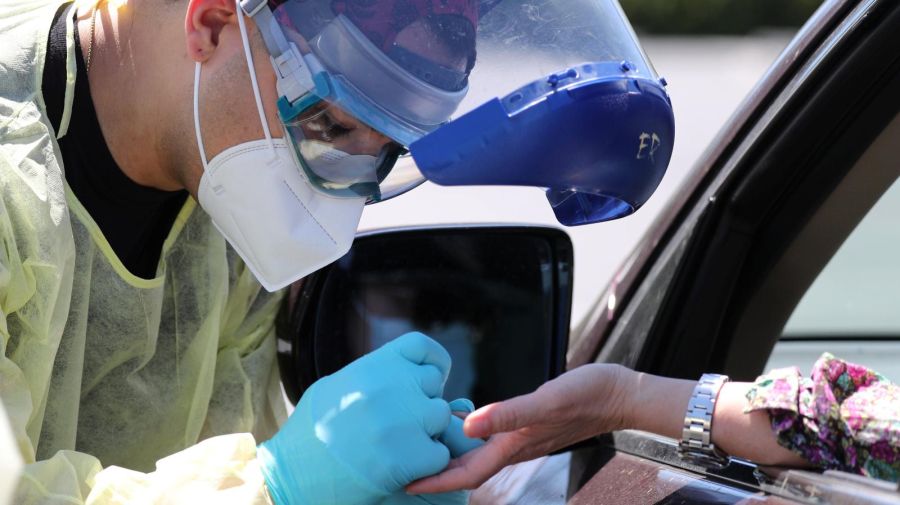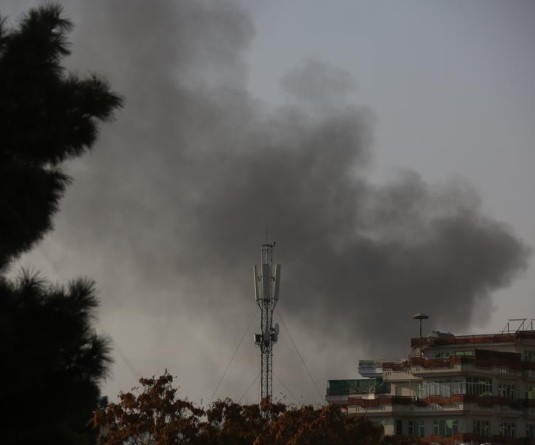1

A healthcare worker administers an antibodies test. (Reuters File Photo)
Christine Soares
Reuters*
With much of the world living in lockdown, the spread of the new coronavirus, SARS-CoV-2, that was first detected in China late last year is beginning to slow in some places. As of May 17, 4.6 million had been infected and 310,000 killed by COVID-19, the disease caused by the virus. While a safe, effective vaccine is still more than a year away, researchers are rushing to repurpose existing drugs and non-drug therapies as well as testing promising experimental drugs that were already in clinical trials.
Here is a lowdown on Testing.
TESTING
I. DIAGNOSTIC TESTING
EARLY RESULTS: 0-6 MONTHS
Health policy experts say the United States must dramatically increase the availability of tests for the coronavirus if it is to safely reopen its economy. From the start, laboratory-based diagnostic testing has been hampered by shortages of needed materials such as swabs to collect samples and chemical reagents. U.S. regulators have moved speedily to authorize many new commercial tests, but concerns still remain about their accuracy, and some policymakers say entirely new testing technologies need to be developed to fully contain the virus. At present, two types of diagnostic test are available: one looks for the virus' genetic material, or RNA, and the other looks for viral proteins known as antigens. In general, antigen tests have lower accuracy rates than RNA testing.
CAVEATS: Without additional analysis, neither RNA nor antigen tests can tell the difference between active virus, which could infect others, and "dead" viral particles that are no longer contagious. Researchers believe this may explain some cases of recovered patients testing positive for extended periods.
II. ROCHE: Cobas SARS-CoV-2
EARLY RESULTS: UNKNOWN
Authorized for use by U.S. regulators in March, Roche says it is currently shipping around 8 million tests per month. It requires a sample taken by nasal swab be sent back to a lab for analysis to detect viral RNA. Roche says studies show it can detect very low levels of the virus with 95% accuracy.
III. ABBOTT: ID Now
EARLY RESULTS: UNKNOWN
Approved in late March, Abbott’s rapid, point-of-care molecular diagnostic test can provide results on site to patients within minutes. As of May 4, Abbott said it is producing 50,000 of these tests per day, and plans to ramp up to 2 million by June.
CAVEATS: A study conducted by the Cleveland Clinic reportedly showed the test detected the virus in just 85 of 100 samples from patients known to be positive for the virus.
IV. QUIDEL CORPORATION: Sofia 2 SARS Antigen FIA
EARLY RESULTS: UNKNOWN
Authorized for use in early May, Quidel said this antigen test picks up around 80% of COVID-19 cases
V. FUJIREBIO: Antigen Test
EARLY RESULTS: UNKNOWN
It takes about 30 minutes to get a result with Fujirebio's palm-sized antigen test kit, compared with four to six hours for a standard laboratory process known as PCR, according to Japan's health Ministry. Fujirebio can produce 200,000 kits per week, roughly on par with the number of RNA-based diagnostic tests conducted in April in Japan.
VI. Serology/Antibody Testing
EARLY RESULTS: 0-12 MONTHS
Governments and academic groups have started serosurveys: testing blood for antibodies indicating that a person had been infected by the virus whether or not they had symptoms. But separate, ongoing research is needed to know what type of antibody neutralizes the virus and what concentration of these in the bloodstream protects against a new infection, as well as whether all infections produce a full antibody response, and how long any protection might last.
Antibody tests take small samples of patients' blood and can be conducted in labs or with on-site tests that provide results in minutes. The FDA recently tightened rules on serological test developers after a proliferation of unauthorized tests raised questions about their reliability. Independent academic groups are also testing the individual tests to assess their accuracy.
CAVEATS: Early data on COVID-19 patients suggests that most develop varying amounts of antibodies in response to infection. One pre-publication report analyzed plasma from 175 patients in China and found that a sign of inflammation correlated with higher levels of antibodies and that younger patients were less likely to produce large amounts of antibodies. Data is still lacking on whether mild or symptomless infections generate meaningful antibody responses or protection.
VII. ABBOTT: Architect SARS-CoV-2 IgG Assay
EARLY RESULTS: UNKNOWN
Researchers at the University of Washington School of Medicine say the test, which Abbott launched in April, has a specificity of 99.9% and a sensitivity of 100%, suggesting very few false positives and no false negatives. Abbott has already shipped more than 10 million antibody tests to hospitals and labs.
*Published: April 13, 2020
Updated: May 17, 2020






